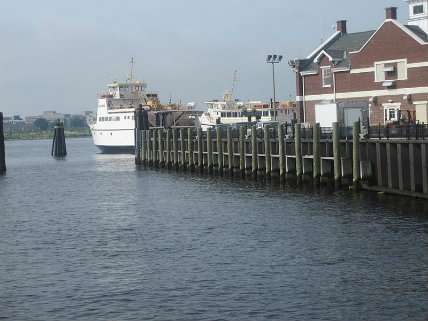Nine years after the Supreme Court’s Kelo decision gutted the right of American property owners to resist eminent-domain seizures, the neighborhood at the center of the case remains a wasteland.
Fort Trumbull in New London, Conn., was bulldozed to fulfill the vision of politicians and developers eager to create a New Urbanist mixed-use “hub” for upscale living in the depressed town near the mouth of Long Island Sound.
But after nearly a decade, the land is nothing but vacant urban prairie. After homeowners were forced off their property for the sake of “economic development,” the city’s original development deal fell apart, and the urban-renewal corporation that ordered the destruction has not found a developer to use the land.
In January, The Weekly Standard’s Charlotte Allen reported on the horizontal blight that was Fort Trumbull, a neighborhood made famous by Kelo v. City of New London (2005), wherein the Supreme Court ruled that government may forcibly transfer property from one private owner to another if the government believes the latter will generate greater economic activity.
Traditionally, these transfers of property, or eminent domain, had only allowed governments to acquire private lands in order to build a public structure like a school or highway. The Constitution permits seizures for such instances of “public use,” but the Supreme Court decision expanded that power to allow governments to acquire people’s land with “just compensation” for a “public purpose,” which in Kelo meant the government’s belief that a different owner might bring in more tax revenue.
Even that chilling premise has failed in New London. Instead of generating more economic activity, New London now has a massive plot of unused land.
New London’s original plan was to raze homes in the neighborhood of Fort Trumbull to make way for a $300 million Pfizer, Inc. research center as well as office buildings, luxury condos, hotels, a conference center, and high-end retail stores. Promising to lop 80 percent off the property-tax rate for a ten-year period, the struggling city hoped the new development would bring in jobs, more residents, and increased consumer spending.
However, in 2008, the construction company charged with developing the land, Corcoran Jennison, backed out due to insufficient capital. In 2009, Pfizer left New London, selling its new facility to a submarine manufacturer a year later.
Two later plans to develop the land likewise fell through. River Bank, a development firm, proposed a residential townhouse development in 2009 (after the city again promised tax abatement), only to have the project postponed and later cancelled due to inadequate funding. Then, in 2010, the Yale Design Workshop, at the request of the city, created plans for a large development that included restaurants, a hotel, offices, art galleries, bicycle lanes, water taxis, a pedestrian bridge to downtown, and more with the use of “private, local, state, and federal funds.” The project never came to fruition.
Fort Trumbull in New London, Conn., was bulldozed to fulfill the vision of politicians and developers eager to create a New Urbanist mixed-use “hub” for upscale living in the depressed town near the mouth of Long Island Sound.
But after nearly a decade, the land is nothing but vacant urban prairie. After homeowners were forced off their property for the sake of “economic development,” the city’s original development deal fell apart, and the urban-renewal corporation that ordered the destruction has not found a developer to use the land.
In January, The Weekly Standard’s Charlotte Allen reported on the horizontal blight that was Fort Trumbull, a neighborhood made famous by Kelo v. City of New London (2005), wherein the Supreme Court ruled that government may forcibly transfer property from one private owner to another if the government believes the latter will generate greater economic activity.
Traditionally, these transfers of property, or eminent domain, had only allowed governments to acquire private lands in order to build a public structure like a school or highway. The Constitution permits seizures for such instances of “public use,” but the Supreme Court decision expanded that power to allow governments to acquire people’s land with “just compensation” for a “public purpose,” which in Kelo meant the government’s belief that a different owner might bring in more tax revenue.
Even that chilling premise has failed in New London. Instead of generating more economic activity, New London now has a massive plot of unused land.
New London’s original plan was to raze homes in the neighborhood of Fort Trumbull to make way for a $300 million Pfizer, Inc. research center as well as office buildings, luxury condos, hotels, a conference center, and high-end retail stores. Promising to lop 80 percent off the property-tax rate for a ten-year period, the struggling city hoped the new development would bring in jobs, more residents, and increased consumer spending.
However, in 2008, the construction company charged with developing the land, Corcoran Jennison, backed out due to insufficient capital. In 2009, Pfizer left New London, selling its new facility to a submarine manufacturer a year later.
Two later plans to develop the land likewise fell through. River Bank, a development firm, proposed a residential townhouse development in 2009 (after the city again promised tax abatement), only to have the project postponed and later cancelled due to inadequate funding. Then, in 2010, the Yale Design Workshop, at the request of the city, created plans for a large development that included restaurants, a hotel, offices, art galleries, bicycle lanes, water taxis, a pedestrian bridge to downtown, and more with the use of “private, local, state, and federal funds.” The project never came to fruition.
Original Thread: US Supreme Court has gone mad!
In the end, the Supreme Court appears to have granted a private business the legal "right" to kick people out of their own homes and steal them just so that it could turn them into a barren wasteland. Good job SCOTUS. Makes me wish the proposl to seize Justice Souter's property for a Hotel had been successful.




Comment